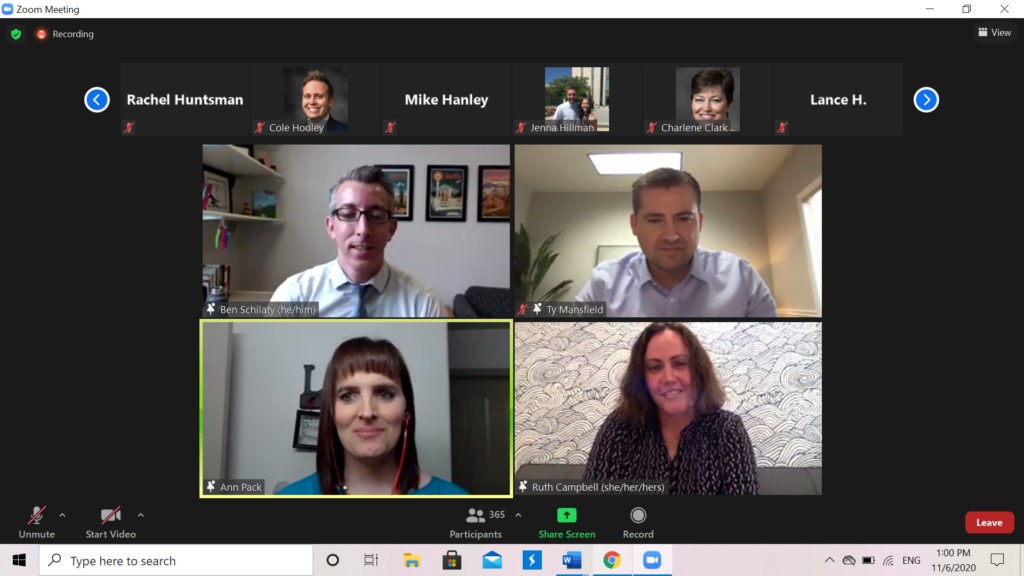Helping others of differing gender identities and sexual attractions was the focus of the 15th annual BYU Social Work Conference held Nov. 6. Two diverse panels addressed over 390 students and faculty over Zoom.
The objective of the conference, as stated on the event web page, was to help clinicians understand the unique needs of and provide effective services for LGBTQ individuals and their families.
Panelists included therapist Ben Schilaty, who is an openly gay, active member of The Church of Jesus Christ of Latter-day Saints; Ty Mansfield, who practices marriage and family therapy and teaches religious education at BYU; and Quintin Hunt, who teaches at BYU and specializes in suicide risk among youth and families. Social worker Ruth Campbell, who identifies as queer; Ann Pack, a transgender woman; and Lisa Hansen, the founder of a behavioral health clinic for LGBTQ individuals in Provo, were also included in the panel.

“We will provide therapy for our neighbors who want to have nothing to do with being baptized in the church that matters to me, so why can I not also provide support for people who have a lifestyle in a different way? Particularly if that lifestyle is not against the law,” Hansen said.
Hansen said that though there is no way to be “value neutral,” research that helps clients maintain behavioral health may not actually relate to personally held spiritual or religious values.
Mansfield said his role with his clients is to help them with their mental health, not to be their ecclesiastical leader.
“I think our role (as social workers) is to challenge and explore what is healthy or not versus what is congruent with our own spirituality or worldview or not,” Mansfield said.
Mansfield said each person has their own path to walk, and he thinks there are life paths that can be lived out in healthy ways, even if they contradict some religious or spiritual principles.
“I don’t have any moral conflict about working with a client who is pursuing a same sex relationship,” Mansfield said. “There are healthy ways to pursue same sex relationships and there are unhealthy ways to pursue same sex relationships. There are healthy ways to be single. There are unhealthy ways to be single. There are healthy ways to pursue mixed-sexuality relationships, and there are unhealthy ways to pursue mixed-sexuality relationships.”
Mansfield said he knows discussing issues of sexual and gender identity is difficult territory, because he has had his own journey experiencing feelings of same-sex attraction. He said he knows what it’s like to be told “almost at every turn” how he should be living.
Campbell said the job of a counselor is to hold space for the person to explore their options and trust that they will find the path that works for them. “It’s really important that you don’t have a bias that’s coming through in your question, that your question really is ‘Where is this person? How can I meet them where they are? How do I help them go where they want to go?’” she said.
Pack said this empathetic approach was helpful for her throughout her hundreds of hours of therapy, when she was navigating her membership in the Church and her relationship with her wife after her gender transition. She also said it’s important to realize that not everyone who struggles with gender identity is transgender, and ultimately decisions about gender identity come from self-reflection and help from God.
Mansfield said some clients he has worked with feel pressure from their parents and others to enter homosexual relationships, when actually they would prefer to remain in the Church and be married. Therapists should encourage the families of clients not to impose futures on their family members. While it is human nature to want to foreclose on decisions early, counselors should help clients see their experiences with gender and sexuality as a journey that takes time, according to Mansfield.
Mansfield also said therapists should approach the parents of people navigating gender identity issues with sensitivity. “Parents have spent their whole lives investing in this child; they have different cares and concerns than we do as therapists. As therapists we have to honor that investment,” Mansfield said.
Campbell said when she came out as queer it meant a lot to her when family and friends would say, “I love you,” and then make a “hard stop,” not going any further.
Pack said she struggles to reconcile her life choices with being a member of the Church, but she really appreciates when members of her ward put their arms around her after sacrament meeting and tell her they love her.
“There’s a lot of questions I have that I’ve just come to accept I’m not going to get an answer in this life,” Pack said. She said some of those questions include why she feels like she is one gender but the Church teaches her that she is another and what it means that she has chosen to continue a relationship with her wife even after transitioning.
“I’ve gotten to a place where I’m fine with not knowing,” Pack said. “I trust that the Lord is able to work everything out, so I’m not worried about it.”




